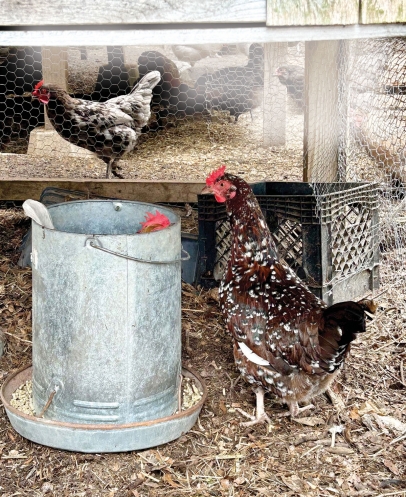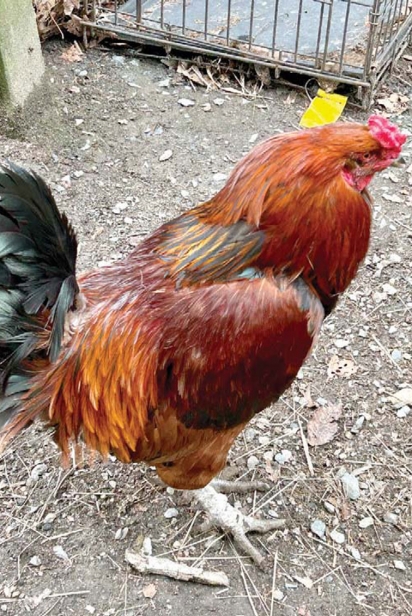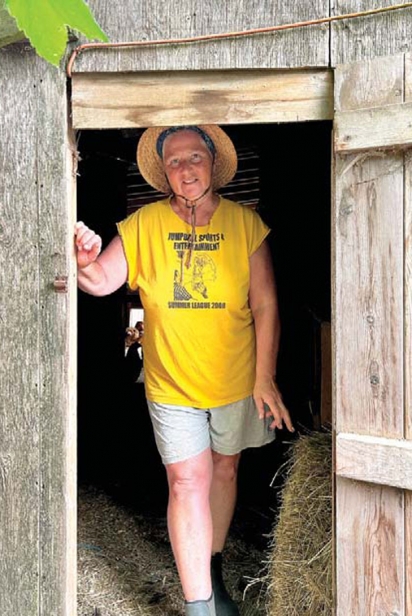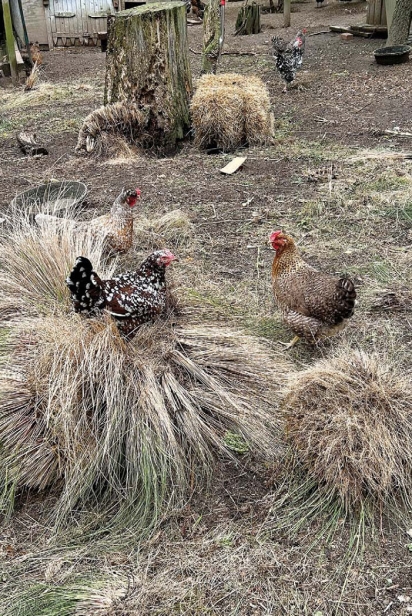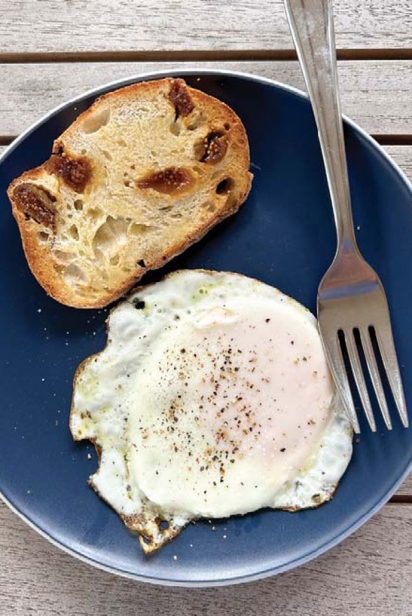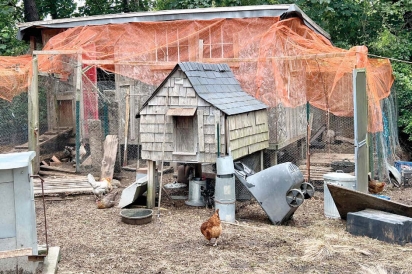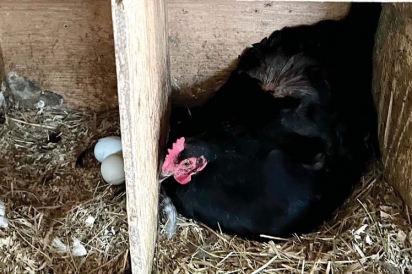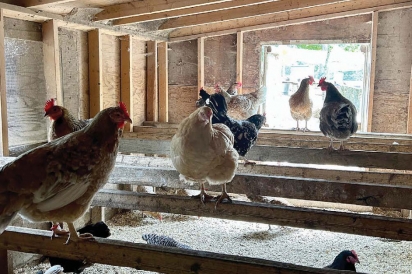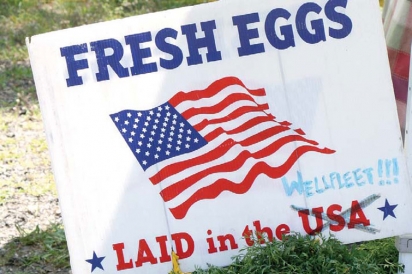Wellfleet Chicken Koop: An Egg-cellent Endeavor
On a hot and humid Saturday afternoon, the magnificent ladies of Wellfleet Chick Koop are mostly unbothered by a visitor in their midst, a few rushing the fence to check out the newcomer, while the rest continue scratching around their spacious grounds and squawking amongst themselves. A hard rain the night before left a hollow under the fence and a few of the birds slipped out, but they can't wander too far before proprietor Victoria Pecoraro scoops them up and returns them to the generous confines of their well-landscaped yard.
A professional landscaper since the early 1990s, when she moved to Wellfleet, Pecoraro got her first flock of 12 chickens in 1999 for her son, then in the ninth grade. “What happened was, I fell in love with them,” she says. “I didn’t ever expect to be a chicken lady or have an affinity for birds. They were my great decompressor. I’d get done with work. I’d go and check on the birds. I would just squat there and they would come around and just be amazing. It became a great passion. I really enjoyed being around them. They helped me in a way I never really thought about.”
When the birds started laying eggs Pecoraro gave them away to family and friends. “We were getting a lot of eggs,” she says, emphasis on a LOT.
Her recipients “couldn’t eat them fast enough.” So she started selling them, initially to the former D&D Market in South Wellfleet (now Blackfish Variety). Very quickly, demand grew, and the greater the demand, the more chickens she got.
Today Wellfleet Chick Koop is licensed for 150 chickens, which Pecoraro keeps on her three quarters-acre lot, where she also grows vegetables for sale. The poultry farmer specializes in heritage and endangered species. According to the Livestock Conservancy, in the mid-20th century, when chicken breeding became industrialized, several breeds were sidelined in favor of a small number of fast-growing hybrids. As a result, the populations of those breeds declined, some precipitously. The Conservancy now counts more than three dozen breeds that are in danger of extinction.
To meet the Conservancy definition of Heritage Chicken, the birds’ parents and grandparents must be from breeds that were recognized by the American Poultry Association before the mid-20th century. They also have to be reproduced and genetically maintained through natural mating, and they have to be able to survive in an outdoor pasture-based environment.
Pecoraro, who still maintains her organic landscaping business, learned about poultry farming slowly, through research and experience. Initially she raised Barred Rocks, which are hardy and known to be good layers; and Australorps, another productive breed. Later she started raising endangered birds, “knowing we have to keep a broad gene pool or else we’re done,” she says, underscoring the vicious circle that has led to endangerment. If factory farms only raise two or three breeds, hatcheries will have less incentive to breed the heritage birds that are in lesser demand. “As a consumer, it’s important that we try to counteract that by raising them ourselves. If we up the demand, they’ll [hatcheries] start breeding them more. We have to beef up the numbers so they’re not lost.”
“Lately I’ve been getting into pretty birds,” she continues. “If you don’t have some pretty birds, it becomes a job. I did at one point get hooked on Polish birds with the Phyllis Diller hat,” she confesses. “They don’t give you much egg production, but they’re fun. And you have to have some fun.”
One visit to Pecoraro’s farm and it’s easy to see how addictive the pretty birds can be, from the sleek brown Buckeyes to the splendid Speckled Sussex. But this is a business, and, she says, “I want a mix of really good layers. I want mostly excellent layers, for really good consistency.” She rotates her flock every year. “I may have New Hampshire breed one year, and Buckeyes the next,” she says as an example. The birds give roughly the same production, but the farmer values the diversity in her flock.
Most poultry farmers (and backyard chicken enthusiasts) buy their chicks through the mail. The cycle from chick to egg is roughly six months. Though most people buy at the beginning of the year, Pecoraro buys her chicks in October to ensure that she will have eggs during the Cape’s busy season, from May through October. She relies primarily on two suppliers, in Iowa and New Mexico. The latter ships year-round, so she can guarantee a diverse crop even if she orders in the fall.
Pecoraro’s birds eat Green Mountain organic, soy-free feed, kitchen scraps from local restaurants, bugs and other things they free-range on in the yard like organic landscaping debris, and bits from her vegetable garden. Their eggs have gorgeous golden round yolks, and taste so fresh and delicious you almost want to reserve them for your simplest preparations.
She also sells chicken meat, but unlike many poultry farmers who raise different birds for eggs and for meat, her meat birds are retired hens and young roosters. Pecoraro only orders pullets (female chickens less than a year old), but inevitably a few roosters slip into every shipment. She says the retired hens, whose meat is tough because the birds are older, make delicious stew and are great for soup. They also work well in dishes like enchiladas and chicken salad.
All the love in the world does not negate the fact that farming is very hard work. Pecoraro concedes that it is a little more challenging than her landcare and design business. For one thing, the cost of doing business is higher. “I’m a really small farm,” she says. “Even though I have a lot of chickens, and eggs are my main crop, in terms of vegetables, I’m a micro-farm. Crop losses are much harder.” In addition to her farm, Pecoraro grows on a 20-square-foot plot at the Wellfleet Community Garden.
In order to compete with larger farmers at the farmers’ markets, she tries new items every season. “I try to be unique because I can’t compete with some of the other farms,” she says. In recent years she has grown and sold wild edibles, spicy edible mixes and Asian long beans. Usually a couple of years after she sells these new items she starts to see them showing up at others’ stalls. So she moves on to new crops. In 2023 she is growing English peas, which she loves. She says only one other local farmer grows them. She also grows eggplants, cucumbers, garlic, tomatoes, greens and several varieties of peppers, which she uses in her Farmer Friends Hot Sauces. The flavors may vary from year to year depending on the peppers she grows.
Pecoraro sells her eggs and produce at the Wellfleet and Truro farmers’ markets in season; eggs at the Orleans winter farmers’ market and at Wellfleet Marketplace off-season. She also wholesales them to Local 186 in Provincetown, Blackfish in Truro and Ceraldi in Wellfleet. Salty Market Farmstand in Truro also sells her eggs and hot sauce. And she sells her own products, along with select items from local farms, through her online store.
The farmer has begun to think about succession, but has no immediate plans to step down. Like so many businesses on Cape Cod, Pecoraro does not even have enough staff now. She is getting by with part-time, seasonal help. “But we’ve been seeing a burgeoning of new farmers in Massachusetts,” she says. “It’s very hopeful.”
Andrea Pyenson has been a food writer and editor for more than 20 years, contributing to publications including The Boston Globe, Edible Boston, The Washington Post and Fine Cooking. She was co-author of three cookbooks with chef Andy Husbands and his barbecue teammate, Chris Hart, and helped edit the Boston Globe’s New England Seafood Cookbook. Andrea has been a judge with The Readable Feast New England culinary book festival, now in its eighth year, since its founding. She divides her time between Truro and Newton.
Wellfleet Chick Koop
farm@wellfleetchickkoop.com
wellfleetchickkoop.com


